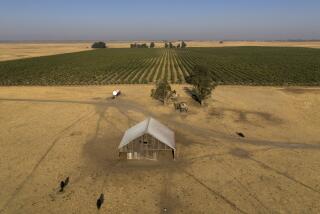Fitness Academy Gains Ground as County Issues Development Permit
A proposed $50-million national fitness academy in Aliso Viejo near Laguna Beach took a giant step closer to reality Wednesday when county supervisors issued a development permit for the facility and included the project in the area coastal plan.
However, supervisors ordered the 300,000-square-foot building scaled down 20%, asked architects to redesign the structure to better suit the rustic site and also requested reduction of the height of a bell tower and a 100-foot “flame of fitness” that had been proposed.
“After all, President (John F.) Kennedy’s grave is marked by a flame that rests on the ground,” Supervisor Thomas F. Riley pointed out Wednesday at a public hearing on the project, which would be located in the Aliso Greenbelt area.
Coastal Panel Must Concur
Both of the board’s actions must be ratified by the California Coastal Commission before ground breaking can take place. But Bill Harris, chairman of the National Fitness Foundation’s building committee, said members have been working closely with commission staff to resolve any environmental concerns by the time the issue comes up for a vote in September.
“We had a good feeling about the hearing,” Harris said. “We have made quite a few concessions, and in the long run the concessions are going to be very positive. I think we’re going to have a first-rate academy.”
The academy, which has been promoted by the President’s Council on Physical Fitness, is intended to serve a maximum of 300 students, mainly coaches and teachers who train youngsters and seniors in physical activities.
Harris stressed that the proposal is “not for the elite athlete; this is strictly for the average American.”
Under the general plans approved Wednesday, the nonprofit academy is to be located on a 195-acre parcel of undeveloped brush and canyon area 2.5 miles from the ocean. The parcel was leased rent-free to the foundation by the county.
New Design Pondered
The original Romanesque style proposed for the building is being reconsidered after community objections that it would look out of place in the rustic, coastal canyon. Harris said architect James Luckman is researching other coastal architecture to come up with a new design that would still “give the impression of strength and durability.”
The proposed building would vary between two and three stories and have a 300-space parking garage for use only by staff, students and teachers, Riley aide Peter Herman said.
Many of the project’s opponents have objected to allowing any vehicular traffic to enter the Aliso Greenbelt. Although the plan approved by supervisors called for a minimum-size roadway into the central building site, that road would have to follow natural cliff lines and make the least possible intrusion in the scenic beauty of the area, Herman said.
Harris said that developers are continuing to negotiate for off-site parking space at the Ziggurat, officially the Chet Holifield Federal Building, in Laguna Niguel. But he said that space was intended for public use and would not change the need for parking on the property.
Greenbelt Group Objects
Members of Laguna Greenbelt Inc., a vocal environmentalist group that has opposed the project, continued to raise concerns about the need for public access to land that was originally dedicated to the county in exchange for allowing nearby development.
“We urge supervisors not to be steamrollered by outside emissaries from Washington into approving a Ziggurat-type project,” said Terry Timmins, acting president of the environmental group, in a reference to the mainly unoccupied federal building nearby.
Timmins also suggested that such an academy would be “redundant,” saying that a similar project was being considered for the U.S. Olympic Complex in Colorado Springs, Colo.
The City of Laguna Beach also has opposed the project, expressing concerns about the design. City Manager Kenneth C. Frank asked supervisors Wednesday to consider imposing a bed tax on those who stay in academy dormitories, contending that it could raise an estimated $300,000 annually to maintain the greenbelt.
County officials disputed the figures but said the legality of applying a hotel-type bed tax to a school and dormitory facility was under review by the county counsel’s office.
More to Read
Sign up for Essential California
The most important California stories and recommendations in your inbox every morning.
You may occasionally receive promotional content from the Los Angeles Times.










